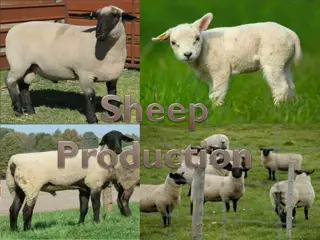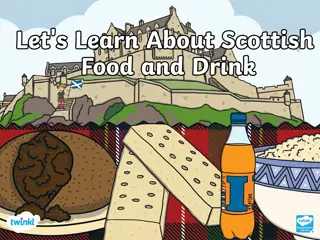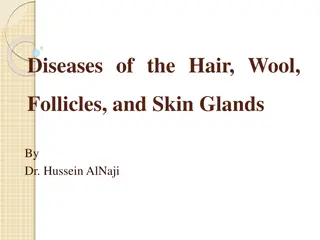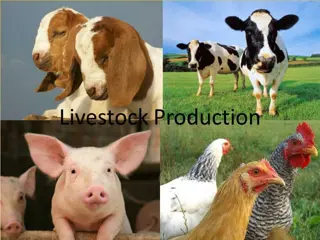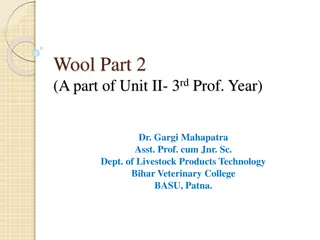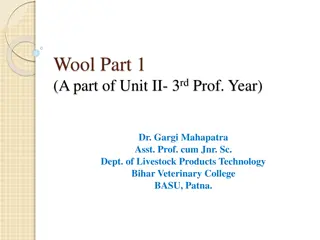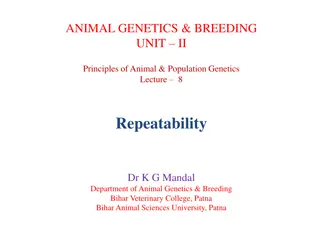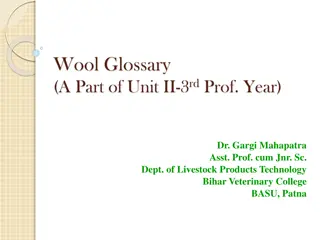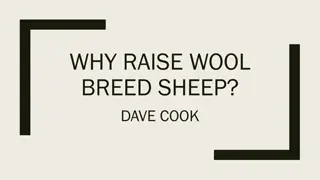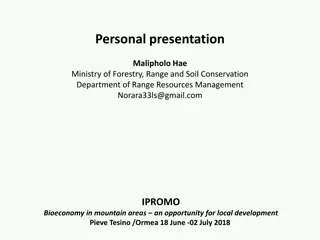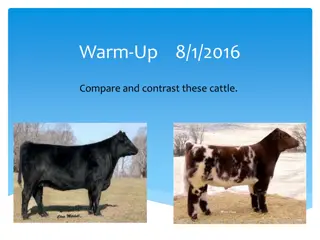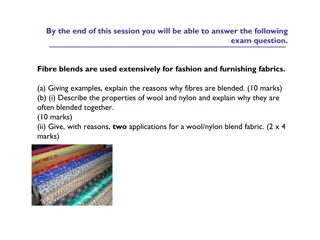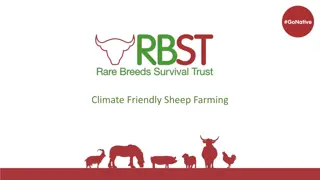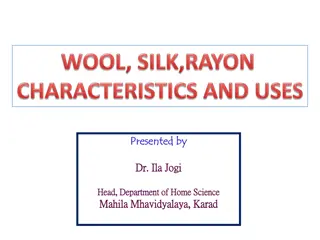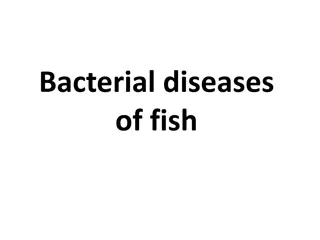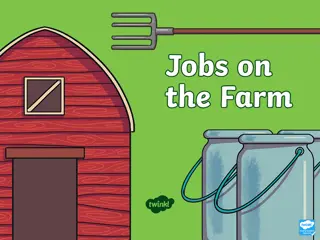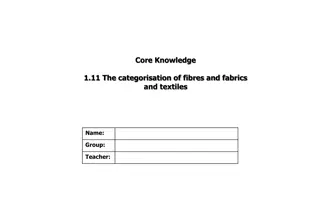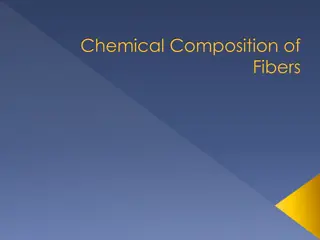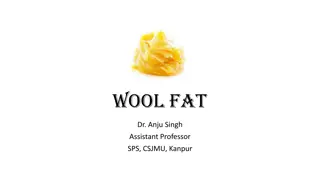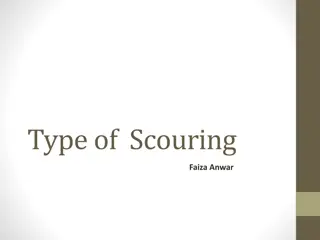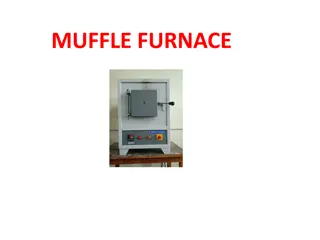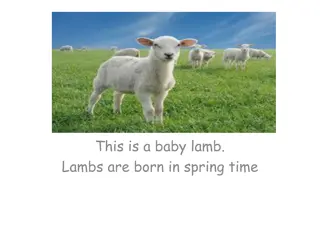Understanding Polymers: Classification and Properties
Polymers are large molecules formed by joining many monomers together. The process, known as polymerization, creates long chains with unique structures. This article explores different classifications of polymers based on origin, monomers, thermal response, formation mode, structure, application, ph
1 views • 13 slides
If you are looking for Laminate Flooring in Beckenham
If you are looking for Laminate Flooring in Beckenham, Flooring Brothers are your experts for carpet flooring, vinyl flooring, laminate flooring and tiling! Our years of experience as installers mean that we can work closely with our clients to find the perfect flooring solution for their needs. Wit
0 views • 6 slides
Sheep Farming Essentials: Terminology, Breeds, and Practices
Explore the fundamental aspects of sheep farming including terminology, breeds like Merino and Rambouillet, and essential practices such as lambing, fleece collection, and managing a flock. Understand key concepts like prolificacy and fine wool production in this comprehensive guide to sheep husband
0 views • 74 slides
Discover Scottish Food and Drink Delights
Scotland's rich farmland produces various ingredients for its famous foods and drinks. From sheep for meat and wool to oats for porridge, Scottish cuisine is diverse and unique. Indulge in traditional dishes like haggis, neeps, and tatties, or satisfy your sweet tooth with treats like shortbread and
0 views • 9 slides
Understanding Diseases of the Hair, Wool, Follicles, and Skin Glands
Diseases of the Hair, Wool, Follicles, and Skin Glands covers various conditions like alopecia, hypotrichosis, and the failure of follicles to develop or produce fibers. It discusses causes, pathogenesis, clinical findings, and treatments related to hair and skin issues. The content delves into cong
0 views • 18 slides
Overview of Livestock Production: Cattle, Sheep, and Goat Breeds
Explore the diverse world of livestock production, including cattle ranching, dairy farming, hog and pig farming, poultry and egg production, and animal aquaculture. Delve into the specifics of sheep and goat production, from breeds and production systems to management practices, breeding techniques
1 views • 43 slides
Development of Wool Follicles in Sheep: A Detailed Overview
Wool production in sheep involves the development of wool follicles starting from the basal layer of the epidermis. The process includes the formation of follicles during gestation, thickening of the basal layer into a plug, growth of accessory structures like glands, and the differentiation of cell
0 views • 17 slides
Unique Exotic Animal Breeds Around the World
Explore a diverse range of exotic animal breeds, from the Angora Rabbit prized for its long wool to the docile Ball Python and stunning Burmese Python. Learn about the California Rabbit bred for meat, the nocturnal Chinchilla, and the Chinese Dwarf Hamster with a distinctive tail. Discover fascinati
2 views • 32 slides
DIY Jellyfish Plush Toy: Step-by-Step Guide
Create your own adorable jellyfish plush toy with this step-by-step guide. You'll need felt, scissors, glue, needle, thread, wool, and stuffing to craft this cute companion. Follow the detailed instructions from designing and cutting the fabric to stitching and stuffing to bring your jellyfish toy t
0 views • 9 slides
Understanding the Physical Structure of Wool Fiber
Wool is a natural protein fiber with a unique structure composed of a cortex and cuticle, lacking a medulla. Its physical structure includes the cuticle as the outer protective layer, cortex with corticular cells, cell membrane complex, macro-fibrils, matrix, micro-fibrils, and helical coils. The st
1 views • 17 slides
Understanding Repeatability in Animal Genetics and Breeding
Repeatability in animal genetics assesses the correlation between repeated measurements of a trait on the same individuals. It partitions phenotypic variance into within-individual and between-individual components, aiding in estimating heritability, resemblance between relatives, and genetic determ
0 views • 18 slides
Life in the Southwest Desert Region
The Southwest Desert region, home to tribes like the Navajo, thrived by carefully managing resources in its hot and rocky environment. Maize (corn), beans, and squash were staple foods, while adobe homes provided shelter. Colorful clothing made of deerskin and wool, adorned with silver jewelry, refl
0 views • 6 slides
Understanding Wool: A Comprehensive Glossary of Terminology in Sheep Wool Production
Dive into the world of sheep wool production with this detailed glossary covering essential terms such as fleece, lock, greasy wool, kemp, keratin, crimp, staple length, suint, lanolin, burr, scouring, carbonization, shearing, and more. Explore the nuances of wool processing, from fiber characterist
0 views • 8 slides
Raising Wool Breed Sheep: Why It Matters in Showing and Selling
Discover the significance of raising wool breed sheep, including the benefits of high-quality wool, the importance of wool quality in show placements, and how judges evaluate fleece quality in competitions. Explore the competitive edge, ease of handling, and less competition compared to meat breeds.
1 views • 28 slides
Mountain Bioeconomy: Local Development Opportunities in Forestry Conservation
Malipholo Hae from the Ministry of Forestry in Lesotho is actively engaged in various activities such as rangeland rehabilitation, wetland conservation, livestock emergency response, and wool promotion projects. She is also involved in research, conference participation, beading, and sports activiti
0 views • 6 slides
Livestock Classes and Breeds: A Comparative Overview
Livestock consists of major classes such as Dairy, Beef, Sheep, Swine, and Goats, each serving specific purposes like milk, meat, wool, and more. Understanding the types of livestock within these classes, feeding requirements, and the distinction between purebred and crossbred animals is essential f
0 views • 9 slides
The Art of Fibre Blending in Textile Industry
Fibre blends enhance fabric qualities by combining different fibres to achieve desired properties. Wool and nylon, for example, are blended to improve strength and durability in garments like socks. Blending fibres also allows for unique finishes, increased dye absorption, and improved crease resist
0 views • 10 slides
Understanding the Properties of Materials for Clothing Selection
Different types of garments are required for varying weather conditions and activities. Fashion designers must comprehend material properties to choose the ideal fabric for maintaining garment functionality. Fabrics like wool and fleece serve as thermal insulators, keeping individuals warm in cold w
0 views • 17 slides
Understanding Climate-Friendly Sheep Farming in the UK
UK sheep farming plays a vital role economically, environmentally, and culturally. The industry faces challenges with greenhouse gas emissions, prompting a focus on wool carbon content and mitigation strategies. Sheep contribute to soil health, moorland restoration, insect diversity, and local brand
0 views • 28 slides
Natural Fibres: Wool and Linen Applications and Characteristics
Wool, sourced from sheep, is known for its crimped appearance, elasticity, and hygroscopic nature. It finds applications in clothing, blankets, and upholstery. Linen, made from flax, boasts exceptional coolness and freshness, with applications in apparel, home furnishings, and industrial products. B
0 views • 19 slides
Discover Australia: Quick Facts and Highlights
Explore interesting quick facts about Australia, from its 18th-century history to iconic landmarks like Canberra and Anzac Day. Learn about its diverse geography, with the continent's highest mountain, bustling cities, and unique wildlife. Delve into the significance of Anzac Day, James Cook's explo
0 views • 33 slides
Discovering Anglo-Saxon Clothing: Materials and Styles
Explore the clothing worn by Anglo-Saxons, including materials like wool and natural fibers, and different styles for men and women. Learn about tunics, dresses, leggings, brooches, and more. Get creative by designing your own Anglo-Saxon outfit for a party using the inspiration from historical imag
0 views • 9 slides
Designing a Fun and Tech-Infused Charity Costume for Marathon Runners
Your task is to design a charity costume for marathon runners that promotes the cause effectively, looks engaging, and incorporates cooling technologies. Consider fabric type, ease of movement, and recyclable materials. Explore fabric options, from natural fibers like cotton and wool to synthetic fi
0 views • 18 slides
Journey from Concept to Completion: A Business Establishment Story
Embark on the journey of establishing a bakery from sourcing materials like wool for carpets, stones for flooring, and furniture to creating a website and even needing oats for your bakery goods. Explore the interconnected process involving various industries and resources that contribute to setting
0 views • 15 slides
Understanding Bacterial Diseases of Fish: Columnaris Disease Overview
Columnaris disease, also known as Saddleback disease, is a common bacterial infection in fish that is often brought about by poor handling and high stress levels. This disease manifests as tail and fin rot, leading to rapid fish mortality. The causative organism, Cytophaga (formerly Flexibacter), is
0 views • 21 slides
Life on the Farm: Jobs and Responsibilities of Farmers
Farmers play a crucial role in growing food and caring for animals on farms worldwide. From feeding and cleaning animals to milking cows and collecting eggs, there are various tasks involved in farm life. Farmers also look after baby animals, herd sheep, and shear wool in addition to managing crops.
0 views • 19 slides
Exploring Fibres and Fabrics: Natural vs. Synthetic, Weaving Techniques, and Non-Woven Textiles
Dive into the world of textiles with a focus on natural and synthetic fibres, weaving methods such as plain and twill weave, and non-woven textiles like felted wool. Discover the properties, characteristics, uses, advantages, and disadvantages of each type, including insights into animal and plant-b
0 views • 9 slides
Understanding Insulation and Energy Saving in Grade 7 Natural Sciences
Exploring the significance of insulating materials in energy conservation. Learn how various materials help in keeping cold items cold and hot items hot, along with the importance of insulation for heat transfer reduction. Discover the types of insulators, including those with air spaces like wool,
0 views • 10 slides
Understanding Copper Deficiency in Ruminants
Copper deficiency in ruminants can be primary or secondary, affecting enzyme activity and gene expression. Risk factors include diet, soil characteristics, and breed. Pathogenesis involves effects on tissues, wool loss, body weight, diarrhea, anemia, bone health, and heart function.
0 views • 18 slides
Overview of Fiber Chemical Composition and Types
Fibers consist of polymers made from simple molecules, with natural fibers like wool, silk, cotton, and linen having specific compositions including proteins, cellulose, and glucose. Man-made fibers like rayon and acetate are chemically altered cellulose, while synthetic fibers like nylon and polyes
0 views • 11 slides
Learn New Sound: Illustrated Word Exercise for Phonics
Explore a fun and engaging way to learn a new sound through illustrated word exercises. Follow along with images depicting words like "wool," "foot," "book," and more to grasp the pronunciation and spelling of words with the targeted sound. Enhance your phonics skills and expand your vocabulary with
0 views • 55 slides
Mastering Verb Usage in Writing: Week 5, Day 2 Activities
Enhance your understanding of using verbs effectively in writing through a series of activities focusing on explanation, procedure, and personal recount. Engage in tasks such as revising and practicing with verbs in different contexts to improve your skills. Explore examples of sorting wool, washing
0 views • 8 slides
Understanding Wool Fat: Properties, Sources, and Uses
Wool fat, also known as lanolin, is a pale yellow substance extracted from raw wool. It contains cholesterol, alcohols, and fatty acids and is insoluble in water. Prepared from sheep wool, wool fat is used in creams and ointments as an emollient base. Its purification involves processes like crackin
0 views • 8 slides
Different Methods of Textile Scouring Explained
Wool scouring and solvent scouring are two essential processes in textile production. Wool scouring involves removing wool grease before spinning yarn, while solvent scouring uses solvents to clean fabrics like polyester and nylon. Solvent scouring offers benefits like simultaneous desizing and blea
0 views • 15 slides
Determining Percent Oxygen in Air Lab Guide
This laboratory exercise focuses on determining the percentage of oxygen in air through room volume measurement, sample weight analysis, and chemical reaction calculations. The background information covers the importance of oxygen, historical discoveries, combustion reactions, and the debunking of
0 views • 12 slides
Towards a Sustainable Fiscal Solution: A Small Tax and a Moderate Dividend
Alaska's fiscal challenges post-2014 oil price collapse led to budget cuts and restructuring of Permanent Fund earnings. Representative Adam Wool's proposal aims to balance the budget by adjusting the dividend formula and introducing new revenues through a small tax. The Ways and Means Committee exp
0 views • 24 slides
Understanding the Versatility of Muffle Furnaces in Industrial Settings
Muffle furnaces play a crucial role in heat treating steel products and conducting various processes requiring controlled atmospheres. These furnaces, such as bench-top and portable configurations, are widely used in industries for applications like extracting zinc, testing precious metals, and heat
0 views • 20 slides
Discover the World of Lambs and Sheep
Explore the adorable world of baby lambs, ewes, and rams. Learn about the nurturing mother sheep, the playful lambs in green fields, and how farmers shear sheep for wool in summer. Delight in images capturing these charming farm animals in their natural habitat.
0 views • 5 slides
Eco-Friendly False Ceiling Materials Trending Sustainable Choices
False ceiling materials like acoustic panels made from sustainable resources, such as recycled cotton or natural wool, provide excellent soundproofing capabilities. By absorbing sound, these panels improve the acoustics of a room, reducing noise poll
0 views • 17 slides


